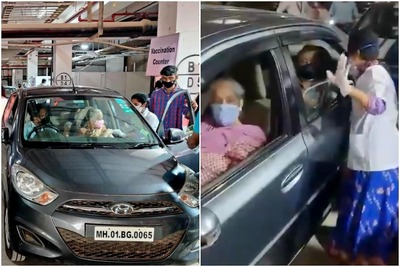
views
New Delhi: In 2017, when VK Sasikala, former general secretary of AIADMK and now convict in disproportionate assets case, managed to empty four women cells in a Bengaluru jail to create her five-room redemption space, little did she know about the 114 per cent overcrowding in Indian jails.
Former union minister P Chidambaram, who is lodged in Tihar jail in the INX Media money-laundering case, also received his share of judicial privileges. He had appealed to a special court to allow him home cooked food, western toilet, medicines etc, surpassing nearly 42 per cent of cases pending at the court this year.
The two high-profile convictions from India’s political class bring us to an important point: the backlog of cases in Indian courts is a double edged sword tearing through life in and outside of prisons. It overlooks its impact on life in jails and the delivery of justice to those undertrials, while launching the justice system into a vicious cycle. Any form of judicial privilege only makes it worse.
An analysis by News18 revealed that the number of undertrial prisoners in Indian jails has risen by 21.5 per cent between 2011 and 2016, as per data from the National Crime Records Bureau. In 2016, undertrial prisoners accounted for 67.70 per cent or 2,93,058 of total prisoners in the country.
At 23.4 per cent, Uttar Pradesh has reported the most number of undertrial prisoners in its jails, followed by Bihar at 9.5 per cent and Maharashtra at 7.7 per cent.
Expect for Tripura, Mizoram and Andaman and Nicobar Islands, all states have reported more than 50 percent of its prison population as under trial.
This large undertrial prisoner population in the absence of a swift justice process is hurting life inside the prison more than one can imagine. The India Justice Report 2019 by the Tata Trusts, which was released on November 7, quantifies some of these experiences.
Despite a 2013 judgment by the Supreme Court, Re-Inhuman Conditions in 1382 Prisons, which echoes the global stands of the Mandela Rules stating basic minimum living requirement in prisons, the “shift towards a safe, sanitary, rehabilitative environment remains distant” as nationwide prison occupancy stands at 114 per cent.
“Much of the overcrowding is accounted for by the presence of ‘undertrials’ – people in custody awaiting investigation, inquiry or trial. For every convict India has two undertrials in its jails,” said the report.
Occupancy rates in central prisons range from 20.5 per cent in Nagaland to a staggering 222.5 per cent in Chhattisgarh. In district jails, Uttar Pradesh has the most dehumanising jails with 168 per cent overcrowding, while Uttarakhand tops the category in sub-jails with over 208 per cent.
A delay in adjudication is directly related to why India ranks a very high 15th out of 217 countries in undertrial incarceration, senior advocate Mahmood Pracha told News18.
“The increase in the number of undertrial prisoners is because of the delay in justice. Pendency of cases in the courts is increasing the workload of judges. They are passing on that load to lawyers who are getting longer gaps between hearings. Meanwhile, the court does not also grant bail to the accused still on trial,” he said.
According to Pracha, the rise of undertrial prisoners is coupled to a significant procedural lapse in following Section 309 of the Code of Criminal Procedure which provides that proceedings must occur “day to day” until the adjournment of the case. But this is not strictly followed across tier of the judicial system.
Indeed, around 75 per cent or 2,21,062 undertrial prisoners were confined for a period of 0-1 year, as per the NCRB. There were also 12.4 per cent or 36,346 undertrial prisoners who were confined for 1 to 2 years, followed by 19,889 or 6.8 per cent who were confined for 2 to 3 years.
Besides, 24 states in the country currently have a shortage in court halls against sanctioned judges, the India Justice Report noted.
Data on nationwide pending cases in subordinate courts reflects an even grimmer picture. Out of total 314, 242, 78 pending cases 66.56 per cent cases are pending for 0-3 years. Pending in court for 5-10 years is a staggering 13.53 per cent or 42,51,701 cases, while for 10-20 years it is 6.12 per cent or 19,53,325 cases.
Indian courts have 72,660 cases pending now for more than 30 years.
The India Justice Report 2019 has added another perspective to this. It established that “longstanding vacancies and the increase in case load” are highly interlinked, thus reducing the time and attention spent on each case.
For instance, the report revealed that one in every four sanctioned high courts in each of the 18 large and mid-sized states like Bihar, UP, Gujarat, Jharkhand and MP, judge positions had not been filled.
In six of these states, namely Uttarakhand, Karnataka, Jharkhand, Gujarat, Bihar, Odisha and UP, there was more than 25 per cent vacancy in subordinate courts leading to a upto 40 per cent of cases pending for more than five years.
However, Pracha reminded that one cannot gage at reasons for pendency of cases via the number of undertrial prisoners as causes for pendency are not limited in nature. “Pending cases also include those persons released on bail. A cause list of any court will mostly have cases for those who have been released,” he said.
A total of 13,12,800 undertrial prisoners were released during 2016, out of which 89.2 per cent (11,70,577) were released on bail. The exact figure and suffering of those stuck in prison cannot be ascertained, but it is certain that it is high.




















Comments
0 comment